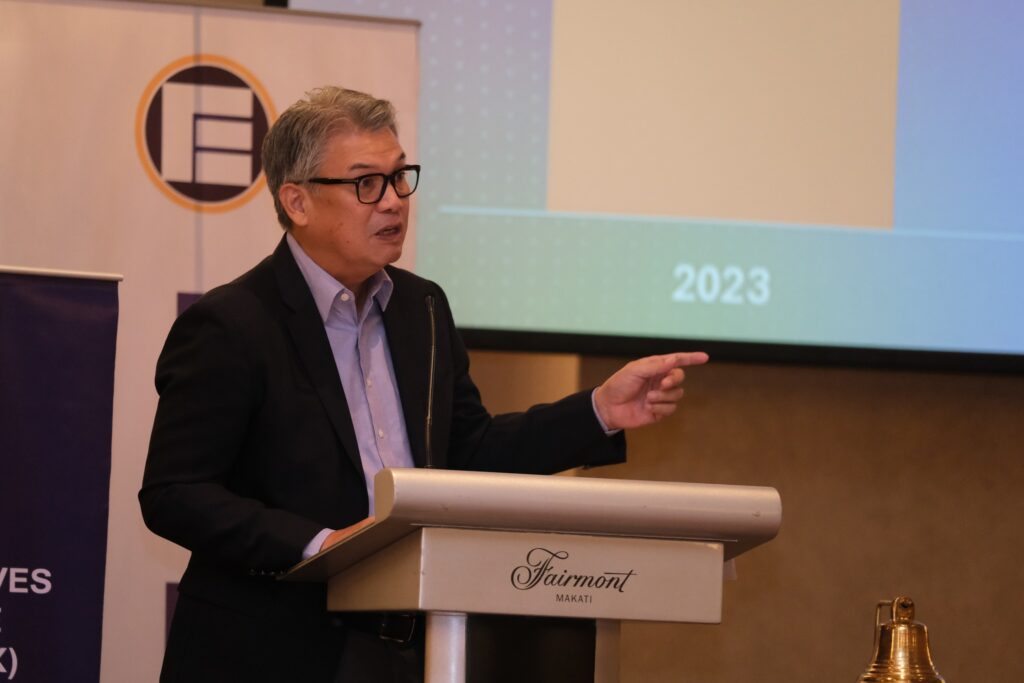Augusto D. Bengzon l August 23, 2024 l Business World

At the 8th FINEX General Membership Meeting, Francis Giles B. Puno, president and chief operating officer of First Philippine Holdings Corp. (FPH), delivered a keynote address that resonated with FINEX’s 2024 theme of “Transformational Growth through Sustainability, Digitalization, and Diversity.” Invited to speak at this event, Mr. Puno provided invaluable insights on the critical role of sustainable power in driving economic development, a topic of paramount importance as the world grapples with climate change and the need for economic resilience.
A compelling aspect of Mr. Puno’s address was FPH’s 2016 decision to cease all investments in coal-fired power plants. This bold move, made even before the Philippine government’s coal moratorium, was driven by the urgent need to transition from fossil fuels to more sustainable energy sources.
In describing this decision, Giles used the metaphor of “burning the ships,” a reference to Hernán Cortés, who ordered his men to burn their ships upon arriving in the New World, leaving no option but to move forward. For FPH, abandoning coal investments was akin to burning the ships — there would be no turning back to old, unsustainable practices. This shift set a powerful example in the industry, aligning FPH with global sustainability goals.
Mr. Puno emphasized First Gen Corp.’s role as the largest producer of electricity from clean natural gas and renewable energy in the Philippines. With over 8,000 gigawatt-hours (GWh) of electricity generated in 2023, primarily from geothermal energy, First Gen accounts for 30% of the country’s total renewable energy production.
First Gen’s $2-billion investment program reflects its commitment to sustainability, with more than 75% of funds dedicated to geothermal and hydroelectric projects, and the remainder allocated to the liquified natural gas (LNG) terminal in Batangas. This underscores the company’s belief that sustainable energy is the future of power generation.
Despite progress in renewable energy, the energy sector faces significant challenges. The growing demand for power, coupled with the aging infrastructure of existing power plants, presents a substantial challenge. Many of the country’s power plants are outdated and inefficient, leading to higher operational costs and increased greenhouse gas emissions.
The sector’s heavy reliance on imported coal exacerbates the vulnerability of the energy supply chain. Global coal prices are volatile, and geopolitical tensions pose risks to energy security. These challenges are further compounded by challenging conditions for new investments in energy infrastructure.
The call was made for a comprehensive approach to these challenges, balancing the need for reliable power at a reasonable price with the imperative to transition to cleaner energy sources. Modernizing the country’s energy infrastructure is essential to meet growing demand while reducing its environmental impact.
Energy security is not just about ensuring that the lights stay on; it is about securing the country’s economic future. A stable and reliable energy supply is crucial for economic growth and development, and this requires a balanced approach that reduces dependence on fossil fuels while ensuring that power is available when and where it is needed.
The role of baseload plants, facilities that provide a continuous and reliable supply of electricity, is essential to this balance. While renewable energy sources like solar and wind are vital to the country’s energy mix, they are also variable, depending on weather conditions. Baseload plants, particularly those powered by geothermal energy, offer a stable supply that can complement these renewable sources, ensuring that the country’s energy grid remains resilient.
There was also a call for policies that encourage investments in sustainable energy infrastructure, arguing that the government has a crucial role to play in creating an environment that is both conducive to investment and protective of consumer welfare. Incentives for renewable energy projects, streamlined regulatory processes, and support for the development of LNG infrastructure are just a few of the measures that could help attract the necessary investments.
Achieving energy security and sustainability requires collaboration across the entire energy ecosystem — from government policy makers and regulators to private sector companies and financial institutions. All stakeholders were urged to work together to create a future where clean, reliable, and affordable energy is available to all Filipinos.
The commitment of FPH and First Gen to lead the decarbonization of the country’s energy future is contained in their current mission: “to forge collaborative pathways towards a decarbonized and regenerative future.” By working together, the Philippines can build a more resilient and sustainable energy future — one that supports economic growth while protecting the environment for future generations.
In conclusion, financial executives and business leaders were encouraged to seize the opportunities that the transition to sustainable energy presents. Adapting to change and prioritizing long-term sustainability over short-term gains is crucial.
Mr. Puno’s speech was a rallying cry for business leaders to take bold steps toward a sustainable future. In a world where the consequences of inaction are increasingly dire, his call to action is both timely and essential. The path to a sustainable future is clear, and the time to act is now.
*** Augusto D. Bengzon is the CFO, chief compliance officer & Treasurer of Ayala Land, Inc., and the 2024 FINEX president. The views and opinions expressed above are those of the author and do not necessarily represent the views of Ayala Land, Inc., and FINEX.

